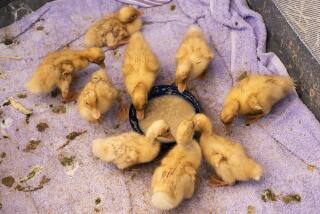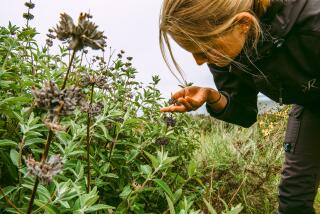New Wildlife Care Center Strives to Right Wrongs
The idea sprouted eight years ago when an American Trader tanker spewed 394,000 gallons of Alaskan crude oil off the city’s coast, killing 1,000 birds and injuring hundreds more.
Shirley S. Dettloff, now the city’s mayor, recalled rushing to Ralphs to buy pans and materials to wash the oil off dying birds. It was a primitive attempt at saving orphaned and injured wildlife, but there were few means of responding to such calamities.
“At that time, we knew we must have a facility on this coastline to take care of wildlife on a daily basis,” Dettloff said.
Those days were far-off memories Friday as proud founders, sponsors and volunteers toasted the grand opening of the Wetlands and Wildlife Care Center of Orange County, the first comprehensive center of its kind in the region.
Years of wrangling over state and city permits have ended. But the quest for funds, additional volunteers and public support is just beginning.
The doors to the center unofficially opened as an emergency operation in January to aid birds injured by a spill of oil and toxic materials into Carson’s Dominguez Channel.
In March, operators of the nonprofit center, including the Huntington Beach Wetlands Conservancy and the Alliance for Wildlife Rehabilitation and Education, received permits from the state Department of Fish and Game to treat injured birds and mammals round-the-clock.
The center, off Pacific Coast Highway, is in front of a Southern California Edison power plant, a major donor to the project. It eventually will treat 25 to 30 animals a day. The founders envision a comprehensive veterinary hospital on the grounds as soon as $200,000 can be raised--and the group has promised to name the clinic after anyone willing to write the check. Another $1 million is needed as an endowment to hire a full-time staff.
The trailer-like building includes six outdoor enclosures, complete with pools, and an indoor nursery and washing area for birds, foxes, squirrels, ducks and other creatures.
Most of the animals will have been hurt by humans.
“Some 90%-95% of all animals are here due to injuries resulting from man’s interference with their habitat--cars, guns, toxicity in water, oil spills and habitat loss,” said Joel Pasco, a veterinarian who helped launch the project.
Project director Gary Gorman said the center expects to treat hundreds of pelicans infected with botulism from the polluted Salton Sea this summer. “It’s happened the last two years,” he said.
The center also needs volunteers.
“This is just a baptism,” volunteer coordinator Engrid Matthews said of the ceremony Friday. “We’re open. We need money. Bring us injured animals.”
For information call the center at (714) 963-2123 or Pasco at (714) 642-7151.
More to Read
Sign up for Essential California
The most important California stories and recommendations in your inbox every morning.
You may occasionally receive promotional content from the Los Angeles Times.










